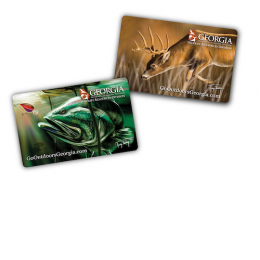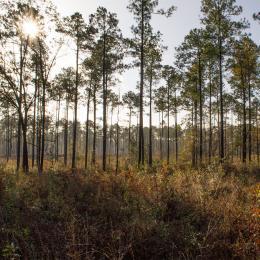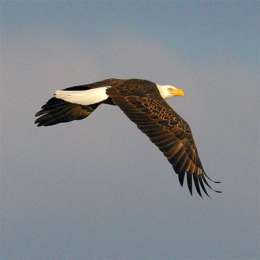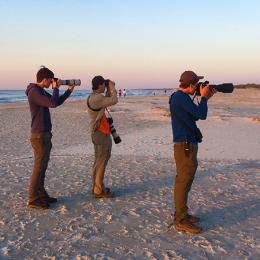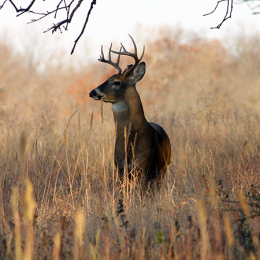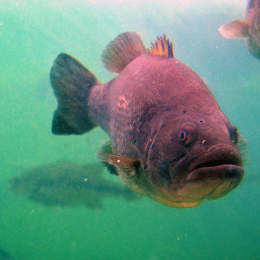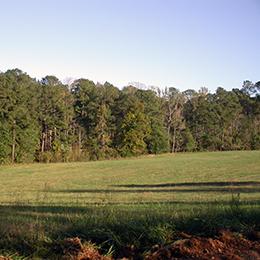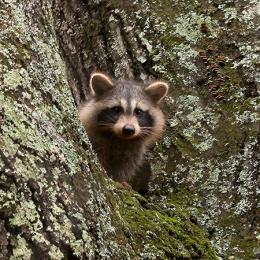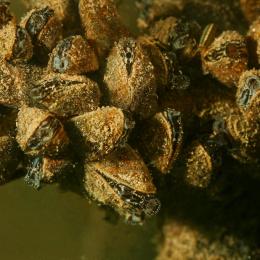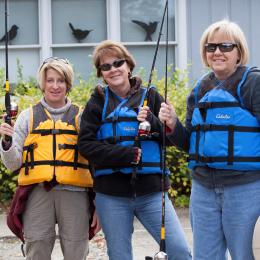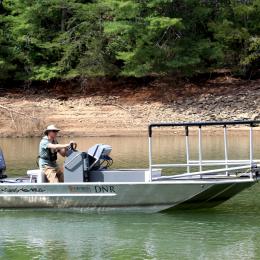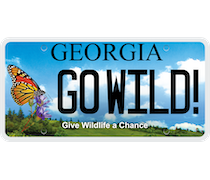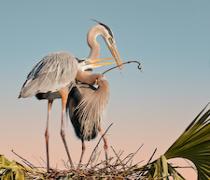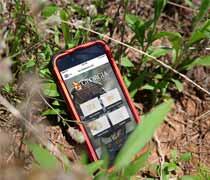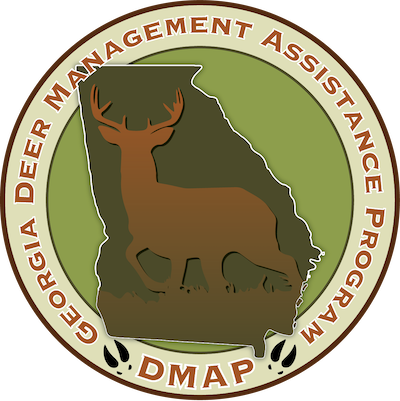 DMAPs are used by most southeastern states to address site-specific deer management issues with science-based flexibility on private lands. DMAPs offer the ability to resolve site-specific deer management issues at the individual property level through data collection and analysis while maintaining simplified and less complex hunting regulations across a much larger geographic area that are responsive to hunter desires (e.g., reduced doe bag limit). This strategy protects more casually managed properties from over-harvest, while affording science-based flexibility for more intensively managed properties.
DMAPs are used by most southeastern states to address site-specific deer management issues with science-based flexibility on private lands. DMAPs offer the ability to resolve site-specific deer management issues at the individual property level through data collection and analysis while maintaining simplified and less complex hunting regulations across a much larger geographic area that are responsive to hunter desires (e.g., reduced doe bag limit). This strategy protects more casually managed properties from over-harvest, while affording science-based flexibility for more intensively managed properties.
Outline
Standards for All Management Levels
- Quarterly DMAP newsletter
- Cooperatives of multiple adjacent lands can be used to meet acreage minimums for harvest flexibility
- Eligible properties include public, private, and leased
- Participants may be an individual or group of individuals
- Fees are assessed annually
- Cooperators may choose any management level
- Cooperators are responsible for collecting harvest data and placing cameras for deer surveys
Management Level 1
- No acreage minimum
- No fee required
Deliverable Services
- General harvest and habitat recommendations
- Technical guidance and data analysis only, no harvest flexibility
Management Level 2
- $200 startup, then $100 annual administrative fee
Deliverable Services
- Data collection package and property signs
- Personalized access to a biologist assigned to the property
- Aging of each deer killed
- Data analysis and site-specific harvest recommendations
- Basic boundary map with landcover
- Annual visit by assigned biologist
- General habitat management recommendations
- When biologically justified, antlerless harvest flexibility (250-acre minimum)
Management Level 3
- $400 startup, then $200 annual administrative fee
Deliverable Services
All Level 2 services plus the following:
- Directly facilitate and coordinate the formation of cooperatives
- Assistance with live aging bucks
- Written wildlife management plan covering forest mgmt., food plots, timeline of land management activities, and annual deer harvest recommendations.
- Map with boundary, landcover, food plots, and forest stand delineation
- When biologically justified, harvest flexibility relating to buck-only days, season length, and antler restrictions (500-acre minimum)
Management Level 4
- $1,000 startup, then $500 annual administrative fee
Deliverable Services
All Level 2 and 3 services plus:
- Detailed habitat and wildlife management plan covering habitat management, food plots, detailed forest stand delineations, stand-specific management recommendations, and detailed timeline
- Detailed map with boundary, landcover, food plots/open areas, forest areas delineated to type, relative age, understory characteristics and densities, soil delineation, burn histories, and camera survey layers
- At least 2 site visits annually by assigned biologist
- Site-specific and criteria-specific buck harvest flexibility (1,500-acre minimum)
Maps of Each Staff's Area

Program Staff
Matt Hinman
Wildlife Biologist
470-628-0769
matthew.hinman@dnr.ga.gov

Matt Hinman grew up in Rincon Georgia. Matt attended Georgia Southern University where he graduated with a B.S. in Biology in 2006. Matt worked as marine technician for the Georgia Department of Natural Resources, Coastal Resources Division on the Coastal Longline Survey, Ecological Monitoring Trawl Survey, and Marine Sportfish Health Survey out of Brunswick GA until 2011. At that point, he promoted into a Marine Biologist position and became a Permit Coordinator for the Coastal Permitting Unit. He relocated to North Georgia in 2014 and worked for Tyson Foods for several years until coming back to the Department of Natural Resources in 2020. He became a wildlife technician based out of Dawson Forest WMA where he earned multiple certifications and gained hands on experience managing public lands. In 2022, Matt promoted to a regional wildlife biologist position in northeast Georgia where he created and reviewed wildlife habitat plans and work plans for 5 Wildlife Management Areas. He planned and lead the prescribed fire crew to achieve record burn acres in 2024. He also served as region representative for the state Deer, Waterfowl, and Alligator committees. He led the CWD collection efforts for the region. He has since transferred to the Deer Management Assistance Program in May of 2024. Matt will work with landowners and cooperators in the northwest portions of the state.
Matt enjoys spending time with his wife, Christine, and son Trevor. When not working he enjoys hunting, fishing, hiking, and cruising mountainous back roads. He is active in his church where he coordinates and manages the audio and visual team.
David Osborn
Wildlife Biologist
(404) 987-1766
david.osborn@dnr.ga.gov
 David grew up in Prescott, Arkansas. He earned a B.S. degree in Wildlife Science at Arkansas Tech University and a M.S. degree in Wildlife Science at Texas Tech University. His graduate research focused on the physical condition of coexisting axis, fallow, sika and white-tailed deer on several ranches in central Texas. After graduate school, David was a biologist for Florida Game and Fresh Water Fish Commission where his tasks included providing antlerless deer permits and technical deer management assistance to private landowners in northeast Florida. He then was a supervisory biologist for Arkansas Game and Fish Commission where he helped manage several public wildlife management areas (WMA), worked closely with the Deer and Elk Biologist, and served on the Deer Planning Committee. He then worked 30 years as the Deer Research Coordinator at the University of Georgia Deer Lab. While at UGA, he managed the Whitehall Deer Research Facility, coordinated deer-related field research in 11 states, coordinated the Deer Management Research Group, and served as a committee member on Georgia’s 2005-2014 and 2015-2024 Deer Management Plans. For several years, while employed at UGA, David owned and operated Wildlife Growers, LLC. The tree nursery sold large fruit trees for attracting and feeding deer. After retirement from UGA, he was recognized for his significant contributions to biology and management of white-tailed deer by the Southeast Deer Study Group. Before joining our DMAP team, he worked as a wildlife technician at Clybel WMA. This public hunting area in Jasper and Newton counties is known for maintaining high-quality habitat for deer and dove.
David grew up in Prescott, Arkansas. He earned a B.S. degree in Wildlife Science at Arkansas Tech University and a M.S. degree in Wildlife Science at Texas Tech University. His graduate research focused on the physical condition of coexisting axis, fallow, sika and white-tailed deer on several ranches in central Texas. After graduate school, David was a biologist for Florida Game and Fresh Water Fish Commission where his tasks included providing antlerless deer permits and technical deer management assistance to private landowners in northeast Florida. He then was a supervisory biologist for Arkansas Game and Fish Commission where he helped manage several public wildlife management areas (WMA), worked closely with the Deer and Elk Biologist, and served on the Deer Planning Committee. He then worked 30 years as the Deer Research Coordinator at the University of Georgia Deer Lab. While at UGA, he managed the Whitehall Deer Research Facility, coordinated deer-related field research in 11 states, coordinated the Deer Management Research Group, and served as a committee member on Georgia’s 2005-2014 and 2015-2024 Deer Management Plans. For several years, while employed at UGA, David owned and operated Wildlife Growers, LLC. The tree nursery sold large fruit trees for attracting and feeding deer. After retirement from UGA, he was recognized for his significant contributions to biology and management of white-tailed deer by the Southeast Deer Study Group. Before joining our DMAP team, he worked as a wildlife technician at Clybel WMA. This public hunting area in Jasper and Newton counties is known for maintaining high-quality habitat for deer and dove.
David and his wife, Lisa, have four children. Three adult children live in South Carolina. Their youngest daughter, Caroline, still lives at home and attends Oconee County High School. David, Lisa, and Caroline are active in their church. In his spare time, David enjoys fishing at Lake Oconee, deer hunting, and squirrel hunting with his dog, Dexter.
Zach Stevens
Wildlife Biologist
706-318-2695
zachary.stevens@dnr.ga.gov
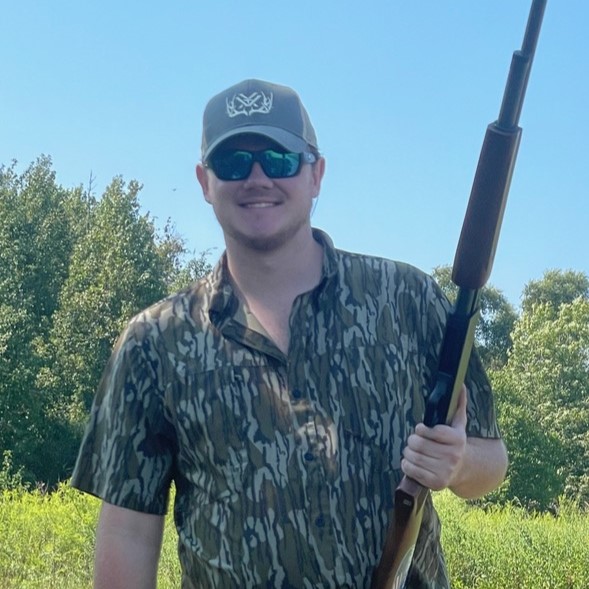
Zach Stevens grew up in Thomasville, NC. Zach first attended Haywood Community College (HCC) where he obtained his Associate’s Degree in Fish and Wildlife Management Technologies, as well as a certificate in forestry. Following his education at HCC, Zach attended Abraham Baldwin Agricultural College (ABAC) where he earned his Bachelor’s Degree in Natural Resources Management with a Concentration in Wildlife. During his time at ABAC, he got to work with The Georgia Wildlife Federation as an Academics Afield coordinator to teach new hunters the skills needed to hunt and process wild game. Following graduation from ABAC, Zach took a Private Lands Biologist Position with The Kentucky Department of Fish and Wildlife Resources in February of 2023. After serving a 8 month tenure, he moved to South East GA to work with GADNR as a Bobwhite Quail Initiative Program Private Lands Biologist in November of 2023. He has since went on to transfer to the GADNR Deer Management Assistance Program in March of 2024. Zach will work with landowners and cooperators in the Southern third of Georgia.
In his free time he enjoys hunting, trapping, fishing, and training his dogs.
Tripp Colter
Wildlife Biologist
478-550-5194
jarrell.colter@dnr.ga.gov
 Tripp Colter grew up in Jones County, Georgia and got his start in the wildlife and forestry fields at an early age hunting and cruising timber with his dad. Tripp attended Abraham Baldwin Agricultural College where he received a Bachelor’s Degree in Natural Resource Management. While at ABAC he began his career with DNR as a land management technician for the Wildlife Conservation Section. He was involved heavily with prescribed fire and habitat restoration projects on public lands in west central Georgia. He remained with WCS for seven years, promoting up through the technician levels, and then took on a supervisory role in Game Management for the coastal region. He supervised wildlife technicians and covered multiple properties including Ossabaw Island, Richmond Hill, Townsend, and Griffin Ridge WMA’s. He oversaw land management practices on these properties and was responsible for purchasing and logistics for the work group. After several years, Tripp and his wife Allison decided to move back to middle Georgia and Tripp transferred to the Deer Management Assistance Program in February of 2025.
Tripp Colter grew up in Jones County, Georgia and got his start in the wildlife and forestry fields at an early age hunting and cruising timber with his dad. Tripp attended Abraham Baldwin Agricultural College where he received a Bachelor’s Degree in Natural Resource Management. While at ABAC he began his career with DNR as a land management technician for the Wildlife Conservation Section. He was involved heavily with prescribed fire and habitat restoration projects on public lands in west central Georgia. He remained with WCS for seven years, promoting up through the technician levels, and then took on a supervisory role in Game Management for the coastal region. He supervised wildlife technicians and covered multiple properties including Ossabaw Island, Richmond Hill, Townsend, and Griffin Ridge WMA’s. He oversaw land management practices on these properties and was responsible for purchasing and logistics for the work group. After several years, Tripp and his wife Allison decided to move back to middle Georgia and Tripp transferred to the Deer Management Assistance Program in February of 2025.
Tripp and his wife enjoy many outdoor pursuits including hunting, fishing, hiking and simply getting outside to enjoy creation together.
Ben Peterson
Wildlife Biologist
404-987-3944
Benjamin.peterson@dnr.ga.gov
 Ben Peterson grew up in Birmingham, Alabama. Ben attended Auburn University where he graduated with a B.S. in Wildlife Management and Ecology. After graduation, he was hired as a Wildlife biologist at Fort Eisenhower (previously Fort Gordon) in Augusta, GA. Ben has worked in many aspects of wildlife management such as game management, planned habitat management, wildlife population surveys, marked and cruised timber, fisheries management, created and maintained food plots, public outreach, and operated various heavy equipment. He also led the threatened and endangered species program focusing on the red-cockaded woodpecker, gopher tortoise, and the state's rare southeastern American kestrel. Ben was also on the wildland fire team where he prescribed burned nearly 100,000 acres and obtained 7 wildland firefighting certifications. Ben joined the Deer Management Assistance Program in March of 2025.
Ben Peterson grew up in Birmingham, Alabama. Ben attended Auburn University where he graduated with a B.S. in Wildlife Management and Ecology. After graduation, he was hired as a Wildlife biologist at Fort Eisenhower (previously Fort Gordon) in Augusta, GA. Ben has worked in many aspects of wildlife management such as game management, planned habitat management, wildlife population surveys, marked and cruised timber, fisheries management, created and maintained food plots, public outreach, and operated various heavy equipment. He also led the threatened and endangered species program focusing on the red-cockaded woodpecker, gopher tortoise, and the state's rare southeastern American kestrel. Ben was also on the wildland fire team where he prescribed burned nearly 100,000 acres and obtained 7 wildland firefighting certifications. Ben joined the Deer Management Assistance Program in March of 2025.
Ben enjoys spending time with his wife Megan, and they are active in their local church. When not working, he enjoys working outdoors, hunting, Fishing, and racing part-time.
Kevin Rose
Deer Management Assistance Program Supervisor
Wildlife Biologist
706-318-0823
kevin.rose@dnr.ga.gov
 Kevin Rose grew up in North Augusta, SC. Kevin attended Auburn University where he graduated with a B.S. in Wildlife Sciences in 2004. After a Summer working for Virginia Tech at Eglin Air Force Base, Kevin attended the University of Arkansas-Monticello where he earned his M.S. in Forest Resources under Dr. Don White. Following grad school, Kevin worked as the Field Coordinator for the Virginia Tech Red-cockaded Woodpecker Research Team at Marine Corps Base Camp Lejeune, NC until 2013. Kevin then worked for the Virginia Department of Game and Inland Fisheries as the District Biologist for Northern Virginia from 2013-2019. In that roll, Kevin served on multiple statewide committees including the Deer, Waterfowl, Waterfowl Blind Laws Committees, as well as the Recreation Science Team, and was the Chair of the Human-Wildlife Conflict Committee. In 2019, Kevin moved to Montana to work as a Wildlife Manager before returning to the Southeast in 2021. Kevin joined DMAP in May 2021 as a DMAP Biologist covering the west central and northwest portions of the state. He was promoted to be the DMAP Supervisor in October 2024.
Kevin Rose grew up in North Augusta, SC. Kevin attended Auburn University where he graduated with a B.S. in Wildlife Sciences in 2004. After a Summer working for Virginia Tech at Eglin Air Force Base, Kevin attended the University of Arkansas-Monticello where he earned his M.S. in Forest Resources under Dr. Don White. Following grad school, Kevin worked as the Field Coordinator for the Virginia Tech Red-cockaded Woodpecker Research Team at Marine Corps Base Camp Lejeune, NC until 2013. Kevin then worked for the Virginia Department of Game and Inland Fisheries as the District Biologist for Northern Virginia from 2013-2019. In that roll, Kevin served on multiple statewide committees including the Deer, Waterfowl, Waterfowl Blind Laws Committees, as well as the Recreation Science Team, and was the Chair of the Human-Wildlife Conflict Committee. In 2019, Kevin moved to Montana to work as a Wildlife Manager before returning to the Southeast in 2021. Kevin joined DMAP in May 2021 as a DMAP Biologist covering the west central and northwest portions of the state. He was promoted to be the DMAP Supervisor in October 2024.
Kevin enjoys spending time with his wife, Jackie, and daughter Avery. When not working he enjoys hiking, hunting, fishing, and wildlife photography.
Charlie Killmaster
Deer Program Supervisor
State Deer Biologist
706-557-3350
charlie.killmaster@dnr.ga.gov
 Charlie grew up in Coweta County Georgia and was born with an intense love of the outdoors. He first attended college at Abraham Baldwin Agricultural College before completing B.S. and M.S. degrees in Wildlife Management and Ecology from the University of Georgia (UGA). For his M.S. research, Charlie conducted a research project on the once overabundant deer population of Red Top Mountain State Park assessing ecosystem recovery following deer population reduction. This key project helped pave the way for the use of quota hunts for managing deer on Georgia State Parks. Following that project, Charlie began his career with the Wildlife Resources Division and served in a statewide capacity in the deer program for 13 of those 14 years. Over the course of his career with DNR, Charlie has led several key initiatives including the development of the Deer Management Plan 2015–2024, reinstating doe days where appropriate, the Georgia Game Check harvest reporting system, the Chronic Wasting Disease Surveillance and Response Plan, and the Deer Management Assistance Program. In collaboration with UGA, Charlie has helped initiate several comprehensive research projects including the impacts of coyotes on deer, cranial abscess in bucks, effects of baiting on deer movements, potential effects of antler restrictions on genetics, development of the Georgia rut map, development of a spatial capture-recapture camera survey technique for deer populations, and investigation of the Appalachian deer decline.
Charlie grew up in Coweta County Georgia and was born with an intense love of the outdoors. He first attended college at Abraham Baldwin Agricultural College before completing B.S. and M.S. degrees in Wildlife Management and Ecology from the University of Georgia (UGA). For his M.S. research, Charlie conducted a research project on the once overabundant deer population of Red Top Mountain State Park assessing ecosystem recovery following deer population reduction. This key project helped pave the way for the use of quota hunts for managing deer on Georgia State Parks. Following that project, Charlie began his career with the Wildlife Resources Division and served in a statewide capacity in the deer program for 13 of those 14 years. Over the course of his career with DNR, Charlie has led several key initiatives including the development of the Deer Management Plan 2015–2024, reinstating doe days where appropriate, the Georgia Game Check harvest reporting system, the Chronic Wasting Disease Surveillance and Response Plan, and the Deer Management Assistance Program. In collaboration with UGA, Charlie has helped initiate several comprehensive research projects including the impacts of coyotes on deer, cranial abscess in bucks, effects of baiting on deer movements, potential effects of antler restrictions on genetics, development of the Georgia rut map, development of a spatial capture-recapture camera survey technique for deer populations, and investigation of the Appalachian deer decline.
Charlie’s interest in deer and wildlife doesn’t stop with work, outside the office he spends the lion’s share of his time hunting and fishing with friends and family. Most family vacations Charlie and his wife Lindsay plan with their two daughters include camping combined with hunting or fishing. Over 90% of protein in the Killmaster household is acquired through hooks or bullets. Almost equivalent to his passion for wildlife and conservation is Charlie’s love of cooking and eating wild game and introducing others to it.




